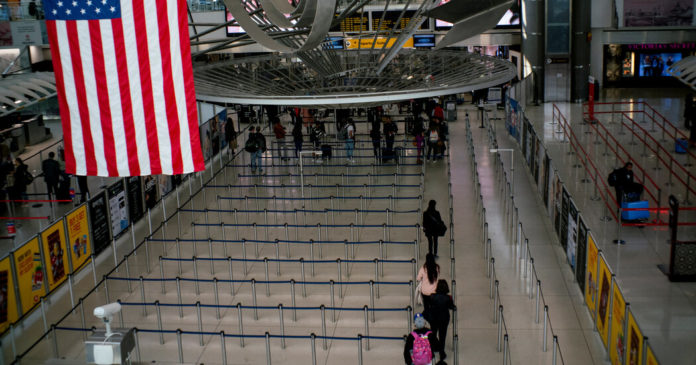The Trump administration on Wednesday issued new rules to curtail travel to the United States by members of the Chinese Communist Party and their immediate families, a move certain to further exacerbate tensions between the two countries.
The new policy, which took immediate effect, limits the maximum validity of travel visas for party members and their families to one month and a single entry, according to two people familiar with the matter. A State Department spokesman said in an emailed statement it was reducing the validity of visas for party members from 10 years to one month.
Previously, party members, like other Chinese citizens, could obtain visitor visas for the United States of up to 10 years in duration. The new measures do not affect party members’ eligibility for other kinds of visas, such as immigration, one of the people added.
In principle, the policy change could affect the travel of roughly 270 million people — China has about 92 million Communist Party members — though in practice, it might be difficult to determine who, apart from high-level officials, belongs to the party. The new visa rules add to the now yearslong conflict between the two countries on trade, technology and much else.
According to the people familiar with the rules, the new guidelines allow American officials to make a determination about someone’s party status based on their visa application and interview, as well as officials’ local understanding of Communist Party membership. That could mean that the policy disproportionately hits China’s top government and business leaders rather than the millions of lower-level members who join the party to get a leg up in areas as varied as business and the arts.
A spokesman for the State Department said the move was a part of “ongoing policy, regulatory, and law-enforcement action across the U.S. government to protect our nation from the C.C.P.’s malign influence.”
“For decades we allowed the C.C.P. free and unfettered access to U.S. institutions and businesses while these same privileges were never extended freely to U.S. citizens in China,” he added in an emailed statement.
The new rules are likely to raise hackles in Beijing for targeting the heart of China’s ruling elite. Even so, the restrictions are more moderate than an outright ban on travel by party members, which Trump administration officials had discussed this summer.
Such restrictions are likely to prompt retaliation from China’s government, though travel between China and the United States has already been hugely limited by the pandemic. In 2018, almost three million Chinese citizens traveled to the United States.
Coming in the twilight of the Trump administration, the new rules and the likely Chinese retaliation will be yet another challenge to the incoming administration of President-elect Joseph R. Biden Jr., who is inheriting a U.S.-China relationship that is in its worst state since the normalization of diplomatic ties in 1979.
While some have expected a reset of relations from Mr. Biden, his views on China have hardened since he was vice president under President Barack Obama. Mr. Biden appears to be committed to leaving in place many of the tough measures taken by the Trump administration, including tariffs and restrictions on Chinese technology. He has said he will forcefully address China’s human rights violations, including mass detentions in the western region of Xinjiang. Chinese officials have worried that Mr. Biden will be more effective at leading a broader global pushback against China.
Under Mr. Trump, the State Department has also announced other visa restrictions on various categories of Chinese citizens. These include officials responsible for the mass internment and surveillance of Muslim ethnic minorities in the Xinjiang region, journalists working in the United States and officials deemed to be responsible for the political crackdown in Hong Kong.
In May, American officials said the government was canceling the visas of graduate- or higher-level students in the United States who had ties to certain Chinese military institutions. Chinese students make up the largest group of international students in the country.
Source : Nytimes














